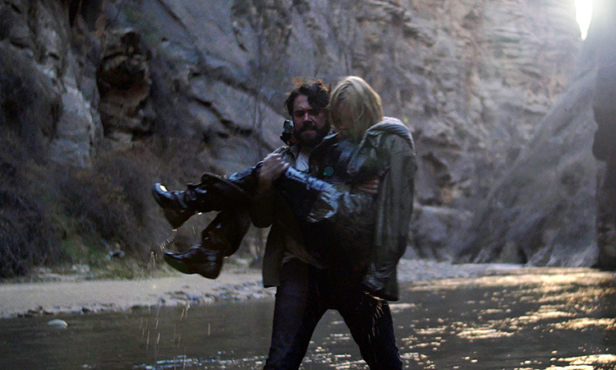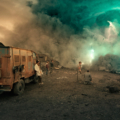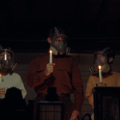Near the end of Night Sky, someone will menacingly promise protagonist Oren (AJ Bowen) “a long excruciating couple of agonisingly painful hours while you – you helplessly wait to bleed out,” adding, “a sensation with which I think you’re pretty familiar.”
Indeed, when we first meet Oren in the film’s opening scene, half-heartedly hiding his flashy red convertible behind a commercial wheelie bin in a dark alleyway before collapsing on a warehouse garage floor, he is already facing his human, mortal condition and bleeding out from a gunshot wound to the gut. Even as Oren knows it’s too late for him, a woman in a hoodie (Brea Grant) appears out of the shadows and, standing over him, says: “I can fix you. What would that be worth to you?” When he wakes the next morning, surprised to have woken again at all, Oren’s wound has impossibly – if not quite permanently – sealed and healed, but he also discovers that he has entered a deal with the woman, named Annie. For she, like Oren, is on the run, and as long as he is on the move, she would like to hitch a ride with him. Ideally, to New Mexico, with a more precise destination to be determined en route.
This latest from director Jacob Gentry, here reuniting – and co-writing – with Bowen after their earlier collaboration on The Signal (2007), will turn out to be a road movie, as this odd couple drive in various vehicles on a fast if meandering trip from LA to Palm Springs (where Jacob’s brother Clay lives) to Zion Canyon in Utah and finally to Pueblo Bonito in New Mexico, and gradually get to know each other, even learn to love one another, along the way. Meanwhile, a well-dressed sociopath (Scott Poythress, also from The Signal and Gentry’s 2004 debut Last Goodbye) is relentlessly on the tail of one or other of them, and leaving a trail of bodies in his own wake.
Even as Oren and Annie’s journey – with the diabolical stranger in pursuit – is bounded by the gravel and dust and sand of the road and of the material world, it also comes, as the film’s very title implies, with a more cosmic dimension. For these three will eventually meet at the horizon, their paths intersecting for a grander spectacle that unfolds at an ancient site of worship. And while it has often been left to religion(s) to illuminate and expound our relationship with the Other, here alternative narrative frames are offered for this spiritual odyssey. Much as the good book that these characters carry along with them is not the Torah, the Holy Bible, or the Koran, but Charles Morrow Wilson’s Stars is God’s Lanterns: An offering of Ozark Tellin’s Stories (1969), the genre through which they travel is less Gospel or Revelations than the science fiction of Steven Spielberg’s Close Encounters of the Third Kind (1977), John Sayles’ The Brother From Another Planet (1984), Jonathan Glazer’s Under The Skin (2013) and especially John Carpenter’s Starman (1984) – only with a Starwoman.
There is still theological allegory to be found in all these celestial encounters, as Annie with her miraculous powers of healing and her direct link to the heavens, and Oren with his pierced side and his emerging capacity for self-sacrifice, both vie to be the film’s Jesus figure, while their sadistic, silver-tongued pursuer is an an obvious candidate for Satan. [spoiler alert] Perhaps this is in part because, as this trinity of characters is manœuvred into position for a drama all at once mysterious, ethereal and transcendent, we may, after all, be witnessing not merely an alien light show, but the ultimate, ever conflicting anxiety and awe of a man painfully bleeding out on the ground (maybe even still on the garage floor from the opening) and ever so slowly finding his way, with eyes upraised, to God.
Night Sky had its world première at FrightFest 2022




